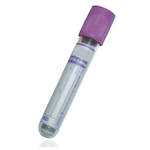Suitable Specimen Types
- Serum
- EDTA Plasma
- Li Hep Plasma
Specimen Transport
First class postSample Processing in Laboratory
Place sample in toxicology rack.Sample Preparation
None requiredTurnaround Time
3 days.Sample Stability
Keep refrigerated. 4 degrees.Dihydrocodeine
General Information
Dihydrocodeine is a semisynthetic narcotic analgesic, prepared by the hydrodgenation of codeine. It is supplied, sometimes in combination with acetaminophen, as the bitartrate salt in 7.5 - 30 mg normal release tablets or capsules and 60 - 120 mg extended-release tablets for oral administration. Single doses of 7.5 - 30 mg of the normal-release forms may be taken every 4-6 hours, with a maximum daily limit of 192 mg.
Adverse reactions to dihydrocodeine include dizziness, drowsiness, lightheadedness, nausea and constipation. Overdosage may result in respiratory depression, coma, convulsions, cardiovascular collapse and death.
Please note, this assay is for the quantitative determination of dihydrocodeine in blood. Dihydrocodeine use may also be detected via our urinary Drugs of Abuse Screen by LC-MS/MS.
Patient Preparation
No patient preperation required.
Notes
Dihydrocodeine analysed by LC-MS/MS
Reference Range
Please contact the laboratory for guidance in therapy.
Units - ug/L
Specifications
- EQA Scheme?: Yes
- EQA Status: LGC QUARTZ, LGC CLIN TOX
